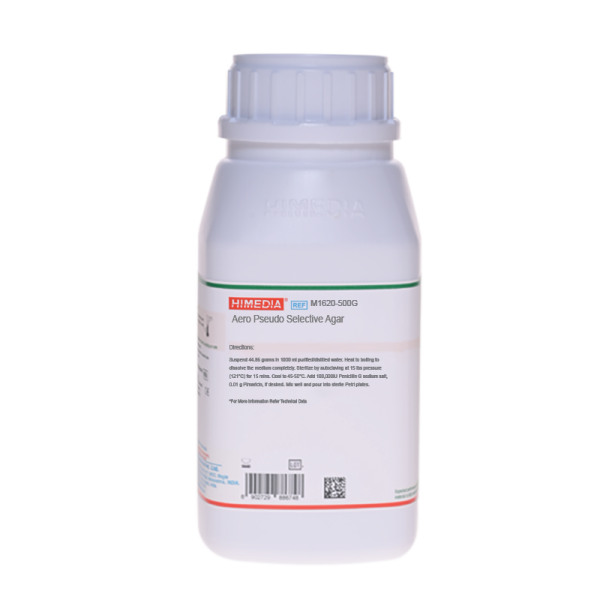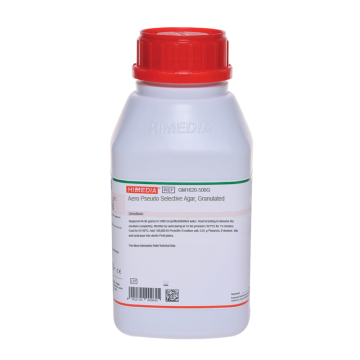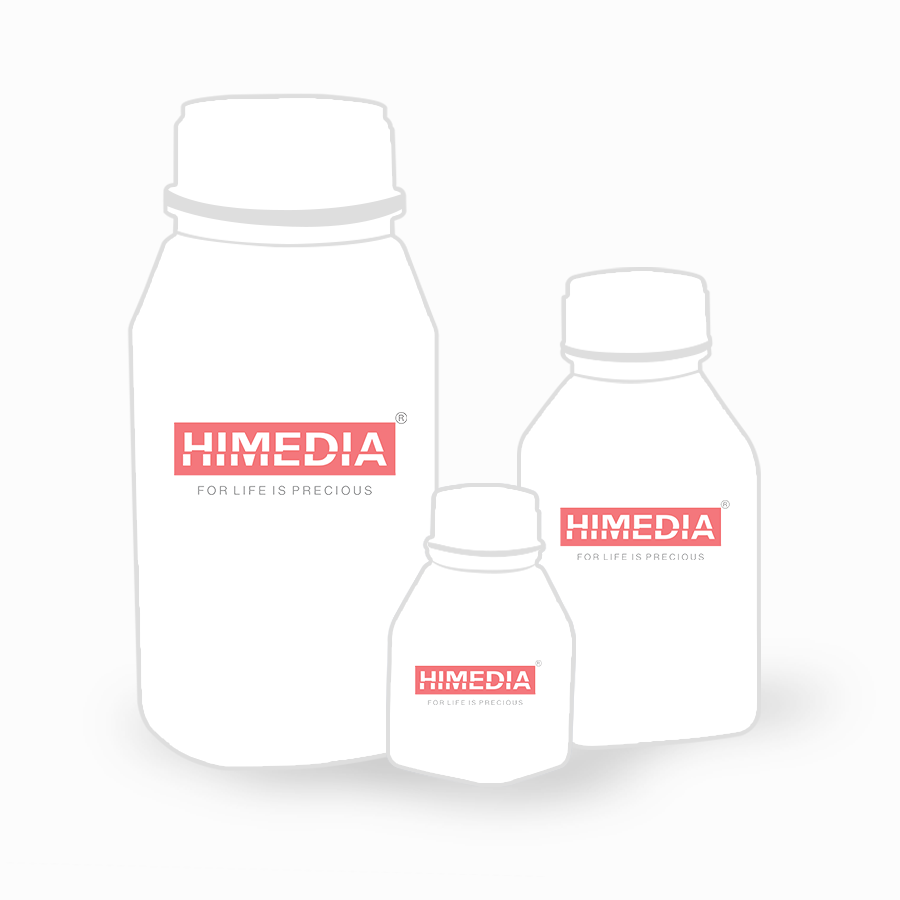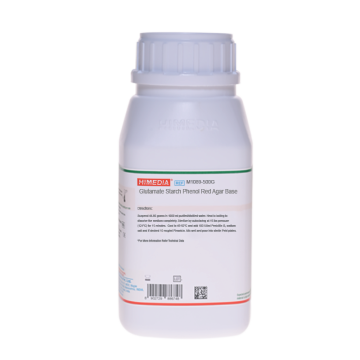 Your enquiry has been submitted
Your enquiry has been submitted
Aero Pseudo Selective Agar
Intended Use
Aero Pseudo Selective Agar is used for detecting Pseudomonas and Aeromonas in food stuffs as well as in waste water and equipment of the food industry.
Composition**
| Ingredients | Gms / Litre |
|---|---|
| Sodium glutamate | 10.000 |
| Starch, soluble | 20.000 |
| Potassium dihydrogen phosphate | 2.000 |
| Magnesium sulfate | 0.500 |
| Phenol red | 0.360 |
| Agar | 12.000 |
Final pH ( at 25°C) 7.2±0.2
**Formula adjusted, standardized to suit performance parameters
Directions
Suspend 44.86 grams in 1000 ml distilled water. Heat to boiling to dissolve the medium completely. Sterilize by autoclaving at 15 lbs pressure (121°C) for 15 minutes. Cool to 45-50°C. Add 100,000 IU Penicillin G sodium salt, 0.01 g Pimaricin, if desired. Mix well and pour into sterile Petri plates.
Principle And Interpretation
Aeromonas may not be truly indigenous to the marine environment, but may have a transient existence after entering salt water via rivers or sewage inputs (1). Foods that come in direct contact with water are likely sources of motile aeromonads, with fish and seafood products most often contaminated (2). Motile aeromonads can survive at low temperatures and therefore have been associated with refrigerated animal products such as chicken, dairy products, raw milk and vegetables (3, 4). The predominant organism found in these foods is Pseudomonas species with the motile aeromonads present in lower numbers. Pseudomonas are capable of causing spoilage because they are psychrotrophic and thus multiply at refrigeration temperatures (2). Also they attack various substances in the food to produce compounds associated with off-flavour and off-odours. Aero Pseudo Selective Agar medium has been proposed by Kielwein for detecting Pseudomonas and Aeromonas in foodstuffs, waste water and equipments used in the food industry (5, 6, 7, 8).
The medium contains sodium glutamate and starch as the only sources of nutrients. Organisms other than Aeromonas and Pseudomonas are unable to metabolize these nutrients sources (9). Aeromonas degrades starch, producing acid. The acid produced causes the phenol red indicator to change from red to yellow. This reaction is not exhibited by Pseudomonas. Added Penicillin G improves the selectivity of the medium. The medium is made more selective by the addition of antimycotic agent namely Pimaricin.
Quality Control
Appearance Light yellow to pink homogeneous free flowing powder
Gelling Firm comparable with 1.2% Agar gel.
Colour and Clarity of prepared medium Red coloured, clear to slightly opalescent gel forms in Petri plates.
Reaction Reaction of 4.5% w/v aqueous solution at 25°C. pH : 7.2±0.2
pH 7.00-7.40
Cultural Response
Cultural characteristics observed with added Penicillin G sodium salt, after an incubation at 35-37°C for 18-24 hours.
| Organism | Inoculum | Growth | Recovery | Colour of colony |
|---|---|---|---|---|
| Escherichia coli ATCC 25922 | 50-100 | none-poor | <=10% | |
| Staphylococcus aureus ATCC 25923 | >=10³ | inhibited | 0% | |
| Pseudomonas aeruginosa ATCC 27853 | 50-100 | good-luxuriant | >=50% | red-violet surrounded by a red violet zone |
| Pseudomonas aeruginosa ATCC 9027 | 50-100 | good-luxuriant | >=50% | red-violet surrounded by a red violet zone |
| Pseudomonas aeruginosa ATCC 10145 | 50-100 | fair-good | 30-40% | red-violet surrounded by a red violet zone |
| Aeromonas hydrophila ATCC 7966 | 50-100 | good-luxuriant | >=50% | yellow surrounded by a yellow zone |
| Aeromonas caviae ATCC 15467 | 50-100 | good-luxuriant | >=50% | yellow surrounded by a yellow zone |
Storage and Shelf Life
Store below 30°C in tightly closed container and the prepared medium at 2 - 8°C. Use before expiry date on the label.
Reference
- Rippey S. R. and Cabelli V. J., 1979, Appl. Environ. Microbiol.,38:108
- Vanderzant C. and Splittstoesser D. F., (Eds.), 1992, Compendium of Methods for the Microbiological Examination of Foods, 3rd Ed., APHA, Washington, D.C.
- Callister S. M., and Agger W. A., 1987, Appl. Environ. Microbiol., 5 3:249
- Hunter P. R. and Burge S. H., 1987, Lett. Appl. Microbiol., 4:45
- Kielwein G., Gerlach R. U., Johne H., 1969, Arch. F. Lebensmittelhyg., 20; 34-38
- Kielwin G., 1969, Arch. F Lebensmittelhyg., 20; 131-133.
- Kielwin G., 1971, Arch. F. Lebensmittelhyg., 22; 15-19.
- Kielwin G., 1971, 22; 29-37.
- Stanier R.Y., Palleroni N. J., 1966, J. Gen. Microbiol., 42; 159-271.
| Product Name | Aero Pseudo Selective Agar |
|---|---|
| SKU | M1620 |
| Product Type | Regular |
| Physical Form | Powder |
| Origin | Animal Free (Veg) |
| Packaging type | HDPE |
| References | 1. Rippey S. R. and Cabelli V. J., 1979, Appl. Environ. Microbiol.,38:108 |
| Customized Product Available | No |






